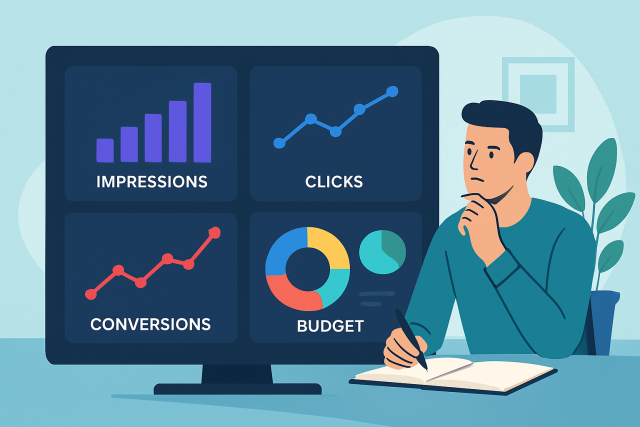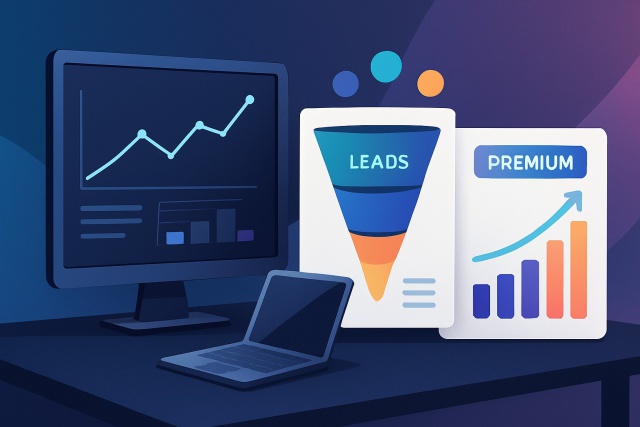What to Look for in an Ecommerce Marketing Agency?


Picking the right ecommerce marketing agency can often be the difference between hitting a sales plateau and seeing your online presence truly take off. With the global ecommerce scene getting more crowded by the day, teaming up with an agency that genuinely understands your market and goals is not just helpful—it’s absolutely important.
This article dives into the key qualities that truly set a top ecommerce marketing agency apart from the rest. We touch on everything—from their strategic savvy and tech know-how to their hands-on industry experience and transparent pricing models. You’ll get a good feel for why some agencies shine while others just barely make the cut.
Why Picking the Right Ecommerce Marketing Agency Really Makes a Difference
A specialized ecommerce marketing agency truly plays a key role in ramping up sales growth and tightening your brand's reputation. They boost customer engagement and streamline your operations so they run smoother than ever. With their seasoned expertise they’re great at spotting growth opportunities that might otherwise slip under the radar and steering clear of costly blunders.
Important Factors to Keep in Mind When Picking an Ecommerce Marketing Agency
- Take a good hard look at the agency's experience and skills with big-name ecommerce platforms like Shopify, Magento, WooCommerce and BigCommerce.
- Check out the full range of marketing services they offer from SEO and PPC to email marketing and social media management. It’s like having a Swiss Army knife for your marketing needs.
- Make sure the agency truly understands your industry and target audience because without that their strategies might feel like square pegs trying to fit into round holes.
- Think about the agency’s size and the expertise of their team. You want a good match for your business’s scale and specific needs. If they are too big you might get lost in the shuffle and if they are too small they might not have the muscle you require.
- Take a close look at their technology stack and how they leverage analytics to guide marketing decisions. Numbers don’t lie and savvy use of data often separates the winners from the also-rans.
- Pay attention to their communication style, transparency and how often they update you. Nothing’s worse than being left in the dark when you’re counting on progress reports.
- Review their pricing structures and contract terms carefully and keep an eye out for any hidden costs that could catch you off guard later.
- Seek out client testimonials, case studies and success stories because it’s the closest thing to a crystal ball in predicting how they might perform for you.
Each of these criteria plays a important role in figuring out whether an agency can actually deliver measurable business results tailored to your unique ecommerce needs.
Working with Ecommerce Platforms and Services A Practical Guide
One key thing to keep an eye on when picking an ecommerce marketing agency is how well they really know the platforms you’re working with like Shopify, Magento, WooCommerce or BigCommerce. They should also boast a solid track record of delivering key marketing services that move the needle—think SEO and PPC advertising, email campaigns, social media marketing and content creation.
Where Innovation Meets Insight in Technology and Data-Driven Marketing
Leading ecommerce marketing agencies often lean on a toolbox packed with advanced tools and software to squeeze every bit of insight out of their data. Platforms like Semrush, Moz and Mangools serve up a goldmine of info on keywords, backlinks and competitor moves and site health checks.
Keyword Research
Offers detailed tools to uncover those high-traffic, relevant keywords that your competitors might be missing, analyze their keyword choices, and sniff out fresh SEO opportunities that can seriously boost your organic traffic.
Backlink Analysis
Keeps a close eye on your website’s backlink profile, tracks the progress of your link-building campaigns, and checks out your competitors’ backlinks so you can strengthen your domain authority and improve SEO results without breaking a sweat.
Site Audit
Runs through your website with a fine-tooth comb to spot issues like broken links, duplicate content, and pesky technical SEO problems that could be dragging down your rankings.
Competitor Analysis
Dives deep into your competitors’ keywords, paid ad strategies, and traffic sources so you can fine-tune your ecommerce marketing and hopefully leave them in the dust.
Content Marketing Platform (available in Guru and Business plans)
Helps you plan, write, and keep track of content that’s perfectly aligned with your SEO goals to boost engagement and organic reach—kind of like having a content coach in your corner.
API Access & White-label Reporting (Business plan)
Lets you seamlessly integrate with your own internal systems and craft customized, branded reports that impress clients and stakeholders alike.
Intuitive interface
Boasts a clean, intuitive layout that takes the headache out of navigating complex marketing tools and reports—because nobody has time for a steep learning curve.
Comprehensive Reporting Options
Offers flexible, detailed reports that cover SEO, PPC, and competitor metrics, giving you a clear picture of how your efforts are paying off.
Advanced Keyword Research
Delivers detailed insights into keyword search volume, competition, and difficulty, helping users zero in on the most impactful keywords for their SEO efforts. Think of it as your SEO compass, pointing you toward winning terms without the guesswork.
Comprehensive Site Audits
Automatically scans websites to spot SEO issues like broken links, pesky technical glitches, and on-page tweaks needed to keep your site in tip-top shape and performing well in search results.
Robust Link Analysis
Keeps an eagle eye on backlink profiles, evaluates link quality, and highlights golden opportunities for building links that boost your domain authority and online cred.
Content Optimization Recommendations
Offers down-to-earth, actionable suggestions to polish on-page SEO factors, improve readability, and elevate content quality, all aimed at better visibility in search engines and keeping users engaged.
Moz Pro SEO Suite
Brings keyword research, site audits, link analysis, and content optimization together in one smooth, all-in-one SEO software platform—think of it as your SEO Swiss Army knife.
Moz Local Listing Management
Helps businesses handle and sync their local listings across multiple directories, giving a welcome boost to local SEO and increasing visibility where it really counts—in local search results.
MozBar Browser Extension
Delivers real-time SEO insights directly in your browser, including on-page metrics, link data, and keyword analysis, making quick, informed decisions feel like a breeze.
Keyword Research
Offers powerful tools to dig up relevant keywords, giving you insights into search volume, competition, and related suggestions. It’s like having a map to create targeted content and SEO plans that actually work.
SERP Analysis
Dives into Search Engine Results Pages to uncover competitor tactics, assess ranking factors, and spot golden opportunities to fine-tune your content.
Backlink Analysis
Scans backlink profiles to pinpoint high-quality inbound links, track down broken ones, and monitor your link-building game for stronger SEO outcomes.
Rank Tracking
Keeps tabs on keyword rankings over time, providing trends and progress reports that make measuring SEO campaign success feel like a breeze—and helps tweak strategies when needed.
KWFinder Tool
A super user-friendly keyword discovery tool that shines at uncovering long-tail keywords with low SEO difficulty—ideal for bloggers, small businesses, and SEO rookies alike.
SERPChecker Tool
Offers deep dives into search volume, keyword difficulty, and SERP features to help you craft content strategies that match the ever-changing search engine landscape.
LinkMiner Tool
Delivers a comprehensive backlink analysis, including quality checks, broken link spotting, and competitor backlink tracking—perfect for fine-tuning your link-building efforts.
Easy-to-use interface
Crafted with simplicity at heart, this intuitive interface makes SEO data feel less like rocket science and more like second nature for users at any skill level.
Affordable Pricing Plans
Brings a variety of pricing options — Basic, Premium, and Agency plans — so professional SEO tools aren’t just for the big spenders but fit nicely into different budgets.

Ecommerce marketing professionals leveraging analytics dashboards to optimize campaigns and track results
What Our Clients Say, Real Success Stories, and Outcomes That Speak for Themselves
Taking a good look at client testimonials and in-depth case studies can really shed light on how an agency operates and adapts. It also shows how they communicate—kind of like peeking behind the curtain. It is smart to zero in on examples that align with your specific industry or business size, especially those that highlight clear gains in sales, traffic and engagement.
Understanding Pricing Models and the Often Overlooked Art of Contract Transparency
Knowing how an ecommerce marketing agency sets its prices can save you from nasty surprises down the road. Some agencies charge by the hour while others stick to flat retainers. Then there are those that prefer project-based fees—each has its own flavor. You might also find agencies offering tiered packages or asking for long-term commitments. This is all fair game but worth noting. Having clear upfront conversations about exactly what services and deliverables come with the fee, any extra costs that could unexpectedly pop up and the fine print around ending the contract can do wonders for protecting your budget and keeping everyone on the same page.
A Quick Dive into the Go-To SEO Tools Favored by Ecommerce Marketing Agencies
Choosing an ecommerce marketing agency or platform means weighing key factors like pricing, core functions, user experience, and scalability based on your business size and future growth. It’s a bit like picking the right pair of shoes — comfort and fit matter just as much as style.
| Key Differences |  |  |  |
|---|---|---|---|
| Pricing | Pro $119.95/mo; Guru $229.95/mo; Business $449.95/mo — a solid lineup with options for pretty much every budget, if you ask me. | Standard $99/mo; Medium $149/mo; Premium $249/mo — a straightforward pricing setup that’s easy to wrap your head around. | Basic $29/mo; Premium $39/mo; Agency $79/mo — definitely wallet-friendly, which can’t be overstated for beginners or small outfits. |
| Key Features | Keyword research, backlink analysis, site audit, content marketing tools — a powerhouse combo that covers all the bases. | Keyword research, site audit, link building, rank tracking — all the essentials packed nicely together. | Keyword research, SERP analysis, backlink analysis, rank tracking — solid tools that don’t overwhelm. |
| Ease of Use | User-friendly for the most part, though beginners might find the learning curve a bit like climbing a hill at times. | Generally intuitive and user-friendly, though some features might make newcomers scratch their heads a bit. | Very user-friendly and accessible for both beginners and intermediate users — perfect if you’re not looking for a headache. |
| Target Audience | Freelancers, startups, SMBs, enterprises, and digital marketers — basically, anyone serious about scaling their ecommerce game. | Digital marketers, SEO professionals, and businesses of all sizes — a versatile choice, really. | SEO beginners, bloggers, small businesses, and digital marketers watching their budget — a practical pick for the cost-conscious. |
| Scalability & Plans | Offers multiple plans including enterprise-level options with API and white-label reports, so no matter how big you get, it’s got your back. | Built to scale, with options emphasizing local SEO and link analysis — especially good if your focus is more neighborhood than worldwide. | Affordable plans with fewer advanced features for larger enterprises — so it’s great for starters but may need a boost down the road. |
| Integration & Customization | Social media monitoring is a bit limited; reports are customizable; API access available at higher tiers — a decent mix, though there’s room to grow. | Offers limited customization and integration options but maintains a strong industry reputation — sometimes reputation counts for a lot. | Limited integrations and fewer options for advanced customization — simplicity is the name of the game here. |
| Support & Resources | Strong customer support paired with extensive training materials that make tackling challenges a little less daunting. | Reliable customer support with frequent updates and helpful educational content — the kind of backup that makes a difference on tight deadlines. | Good support and regular updates, though training materials are less extensive — enough to get you going, just maybe not fly solo yet. |
| Visit Semrush Website | Visit Moz Website | Visit Mangools Website |



When you stack up Semrush, Moz and Mangools each one shines in its own corner for supporting ecommerce SEO - a crucial consideration for any ecommerce marketing agency. Semrush usually takes the cake for competitor insights and thorough keyword wrangling. Moz has built a solid reputation for its local SEO mojo and golden nuggets of link-building data. Mangools steps in as a friendly budget-wise choice that nails key tasks like rank tracking and backlink analysis without fuss.
Key Questions to Mull Over Before Picking Your Ecommerce Marketing Agency
- You usually zero in on ecommerce platforms and tweak your strategies to fit the quirks of each one.
- Sharing examples of ecommerce clients close to my business in size and industry helps you see I have been in similar waters.
- The main metrics and KPIs you lean on keep a finger on the pulse of your campaigns' success.
- Tackling technology integration, data analytics and reporting involves a specific approach.
- Your usual rhythm with communication and reporting when working with clients sets expectations along the way.
- Flexibility with pricing and contract terms is important especially when businesses need extra room to breathe during growth spurts or seasonal ups and downs.
A Simple Step-by-Step Guide to Making Your Final Decision You Can Actually Stick To
Clearly spell out your ecommerce marketing goals and set a practical budget that matches where you want to grow.
Narrow down your options to agencies that meet your key criteria such as experience, the services they provide and client feedback.
Ask for detailed proposals that explain their game plan, deliverables, timelines and costs so you can compare them side by side without guesswork.
Carefully review the technology and tools each agency relies on because you want decisions supported by solid data rather than gut feelings.
Meet with the agencies and check their references to get a true sense of their communication style and cultural fit and whether you can count on them when it matters.
Test your top choice with a small project or trial run to be cautious before making long-term commitments.
Frequently Asked Questions
How do I know if an ecommerce marketing agency truly understands my industry?
Look for agencies that back up their claims with case studies or client testimonials from businesses like yours. It’s worth digging into their experience in your niche. Ask how they’ve tackled industry-specific hurdles and request examples of tailored strategies they’ve crafted for similar clients.
What’s the typical cost range for hiring an ecommerce marketing agency?
Costs can vary depending on the services you want, the agency’s size and your business size. Smaller shops usually charge $1,000 to $5,000 a month. Bigger players might charge $5,000 or even more than $20,000. Make sure you get the lowdown on their pricing model—hourly, retainer or project-based—and watch for hidden fees before signing.
Can a small ecommerce business benefit from hiring a marketing agency, or is it better for larger brands?
Absolutely yes. Plenty of agencies now offer flexible packages for startups and smaller businesses. Look for those willing to adapt contracts and with a proven track record of helping smaller brands punch above their weight. They often focus on tactics like SEO or social media instead of a full-scale blitz.
How long does it usually take to see results from an ecommerce marketing agency?
It depends on your goals and strategies. SEO usually takes 3 to 6 months before you see progress. PPC or social media ads can start pulling traffic in weeks. A solid agency will be upfront about what to expect and keep you updated with measurable results—no smoke and mirrors.
What red flags should I watch for when evaluating an ecommerce marketing agency?
Watch out for agencies that promise the moon overnight, dodge clear pricing or come up empty-handed when you ask for case studies. Poor communication, one-size-fits-all approaches or a fixation on fuzzy metrics like 'increased visibility' without real sales or ROI links are major warning signs something’s off.
Should I focus on an agency’s platform expertise (e.g., Shopify) or their marketing service strengths?
Both matter but if you use a complicated system like Magento or BigCommerce, start with platform expertise. For simpler platforms like Shopify, focus on agencies with proven skills in the marketing services you need—think SEO or PPC. The best agencies combine solid technical skills with sharp marketing strategy, making the whole greater than the sum of its parts.
Further Reading
Unleash Your SEO Prowess with Semrush
Are you struggling to boost your online visibility and drive more traffic to your website? Semrush is the ultimate SEO and digital marketing tool that can take your Internet Marketing game to new heights. With its powerful suite of features, you can gain a comprehensive understanding of your market, optimize your content, and outrank your competitors.
- Uncover Profitable Keywords with Advanced Research
- Analyze Your Site's Health with Detailed Audits
- Monitor Backlinks and Stay Ahead of Competitors
- Streamline Content Creation with Insights and Trends









